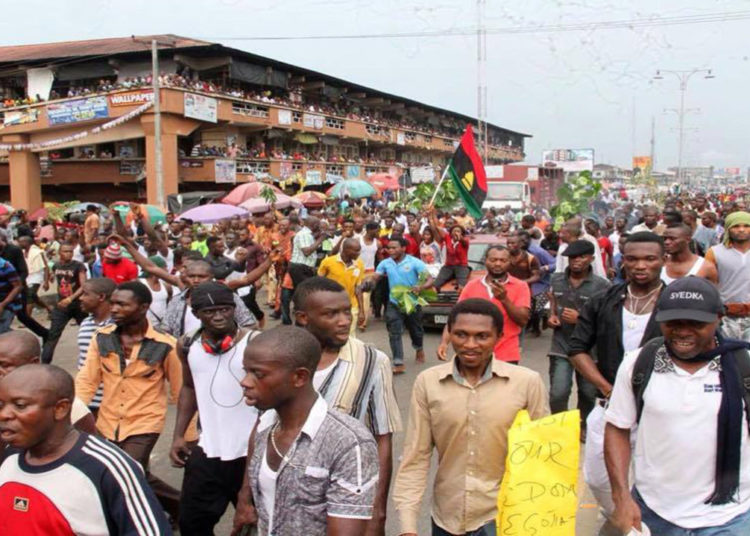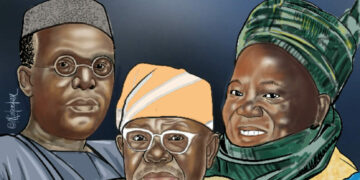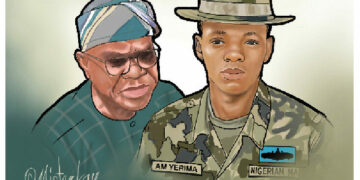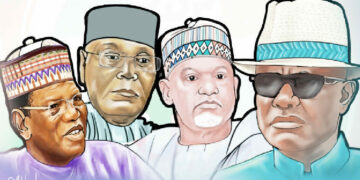The attack, last Sunday, on the Senator representing Anambra South, Ifeanyi Uba, by unknown gunmen is a manifestation of a resolve of some sections of the community in the South-East or, more precisely, Igbo Community to sustain the violence that has continued to define not only the nature of living in the zone but the relationship between it and other zones or parts of the country, particularly the North. The incident which claimed the lives of six persons on the entourage of the senator has effectively re-enforced the fear that the current extreme violence in the South-East being perpetrated by either common criminals, advocates of secession or just some other kinds of agitators will not come to an end anytime soon.
Such a persistent threat to peace, security and corporate existence of Nigeria is justifiably a source of concern for the government and all well-meaning citizens. It is really an enough trouble for the country to experience such an ugly phenomenon that seeks to cripple all its fabrics.
The dismemberment agenda of the Indigenous Peoples of Biafra (IPoB), for example, as well as the intention of some other elements to forestall the conduct of elections in the zone in 2023 are quite unmistakable. Their style is such that increases public apprehension over the possibility of the conduct of the elections next year which consequently necessitates the conclusion that they are mainly out for the destabilization of the country.
It is perfectly true that violence prevails in a lot of the parts of Nigeria, with a lot of groups and communities making complaints, claims and demands that are, in most cases, frivolous and unrealizable. The high rates of kidnapping, banditry, cattle rustling or raw attacks on individuals and communities or even combination of all in one part or another have given a picture of a country that is in a war with itself.
The situation in the South-East is, however, of a special concern because it shakes the foundations of the country and therefore portends several risks for everyone. Both the intensity and scope of the violence in the zone are fully suggestive of the fact it is more a project in which several critical segments of the population are involved than a manifestation of a tendency of some people for indulgence in criminality.
As a zone that has a history of rebellion against the rest of the country, South-East is therefore a place that elicits utmost sensitivity in the government and the citizens over the issues of corporate existence of the country. IPoB’s activities and what has been widely perceived as the passive attitudes of some of the segments of the population in the zone to the violent posture of the group have always been the basis upon which a negative conclusion on the zone is made.
The South-East, undeniably, continuously sinks into crises and therefore profusely stinks, which are the reasons for the incessant expression of disappointment over the failure of the various categories of leadership in the zone to control the situation. It must have been the absence of a genuine willingness, on the part of the leadership, to apply the right quantity of the necessary measures that is responsible for the escalation of violence in the zone.
Although IPoB has since been outlawed and some measures were, at several points in time, adopted by the government for the arrest of the situation, the continuous attacks on the innocent people by the violent criminals indicate some form of official complacency. The daring tendency of the attackers is consistently amplified by the noticeable indifference or even complicity of the leadership at some levels.
Both the open hostility of IPoB and the complacency of the leadership organs in the zone are a clear expression of a deep resentment of the Igbo community to the existing structure and systems in the country. The complaint about marginalization and the demand for the restructuring of the polity in a manner that can guarantee the rectification of real and perceived flaws have always been loud.
These are all concerns that have already generated much bigger concerns from within and outside the South-East and which have continued to manifest in the reactions of other Nigerians to what have appeared to be the subversive acts of many members of the Igbo political class and other agitators. Even with the appreciable restraint of the victims of the violent acts of IPoB and others, the tendency for a reaction in the same manner is speedily becoming stronger.
It is the clear possibility of the occurrence of such an eventuality that is even the most terrifying nightmare now and which the government and some concerned citizens amongst whom are the right-thinking Igbo elements are trying to avert. Patriotic Nigerians have fully come to terms with the fact that the translation of the demands of the violent agitators into realities will spell a terrible doom for the country and are therefore committed to the resolution of all the crises.
Igbo land or, more precisely, South-East is a blessed environment in terms of size and resources which, if properly managed, will continue to serve as an instrument for the attainment of greater unity and faster development. The high spirit of enterprise and adventure of the Igbos have put them above others in the area of commerce, inventions and innovations.
It is these unrivalled achievements of the Igbo as one of the major ethnic communities in Nigeria that those agents of destabilization and disintegration and their collaborators want to destroy. In the course of the pursuance of a cause that is, in a real sense, a threat to the interests of the Igbos, the militant guys are carrying out activities that are akin to the destruction of the South-East.
The attack on Senator Uba is a clear message to the high-profile politicians in that South-East that the threat to lives has now extended to them as well as a pointer to the dangers ahead as the country prepares for the conduct of general elections in 2023. It is a bold statement about the determination of the evil-doers to further make the South-East an environment in which the conduct of elections in particular or governance in general is a risky exercise or even an impossibility.
It is known how the promoters of the Igbo presidency project which has now received a boost, especially with the emergence of Mr Peter Obi as the Presidential Candidate of the Labour Party (LP), are looking at the rise in the rate of violence in the South-East. Even with the intensive members recruitment drive that the party has effectively commenced, the growing negative public perception of its presidential candidate, mainly informed by the various forms of violence in the South-East will definitely count against it. This is just an addition to many other deficits that the zone has already recorded on account of the crimes of some of its own.





